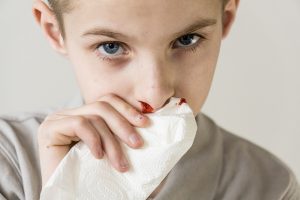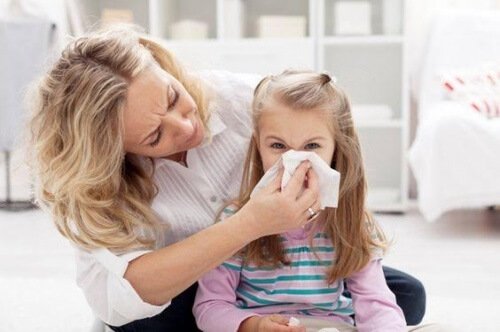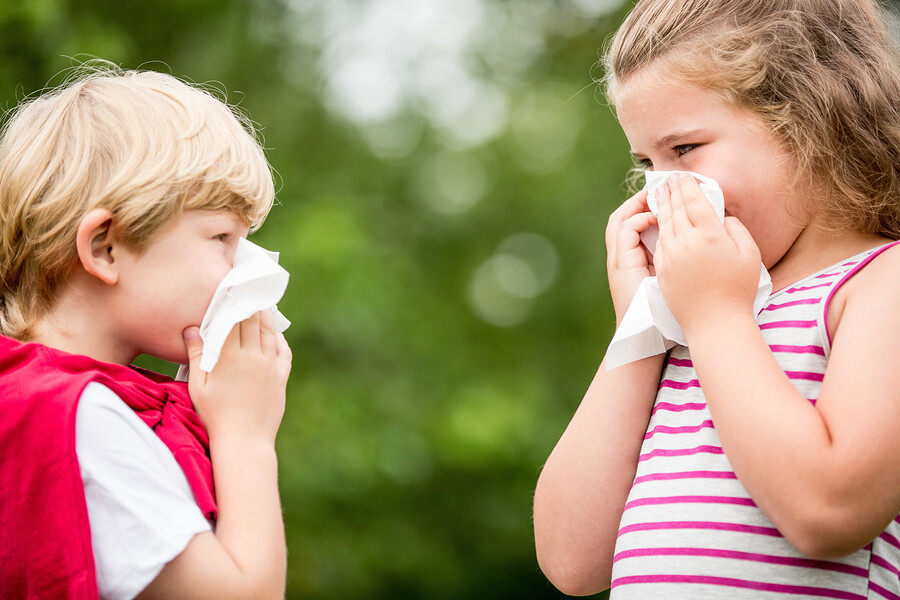Nosebleeds in Children: Causes and Treatment

When your children suddenly get nosebleeds, it can be surprising. In addition to the urgency of cleaning up the blood, you probably also wonder what caused it.
Fortunately, although nosebleeds in children can seem dramatic, they’re usually not serious. However, frequent or severe nosebleeds may indicate more serious health problems, such as high blood pressure or a blood clotting disorder.
Consequently, they must be controlled. Excessive bleeding over a prolonged period of time can also cause additional problems, such as anemia.
Why Does My Child Get Nosebleeds?
The inside of the nose is filled with small, delicate blood vessels that can be damaged and bleed relatively easily. Therefore, nosebleeds can happen if the child’s nose becomes irritated due to dry air, nasal medications or some type of infection.
Nosebleeds can occur spontaneously when the nasal membranes dry out and crack. This is common in dry climates or during the winter months when the air from home heaters is warm and low in humidity.
Children are more susceptible to nosebleeds if they take medications that prevent normal blood clotting. In this situation, even minor trauma can cause significant bleeding.
Certainly, the rarest causes of nosebleeds include bleeding disorders and other systemic diseases. The most common causes are:
- Prolonged inhalation of very dry or cold air.
- Blowing your nose too strong.
- Picking your nose.
- Getting hit in the nose.
- Having something stuck in the nose.
- Suffering allergies.
- Getting an infection in the nose, throat or sinuses.
- Certain medications.
- Efforts to relieve themselves when they suffer from constipation.

How to Act if Your Child’s Nose is Bleeding
You can help reduce your child‘s nosebleed by sitting them in a chair. Then, follow these steps to stop the blood:
- Keep the child sitting up straight and gently bend their head forward. Keep in mind that putting their head back could cause blood to flow down their throat.
- Pinch the soft part of their nose under the bridge. At the same time, have your child breathe through their mouth.
- Try to keep the pressure for about 10 minutes. If you stop too early, your child’s nose will likely start to bleed again. You can also apply ice to the bridge of their nose, which can reduce blood flow.
“Frequent or severe nosebleeds may indicate more serious health problems, such as high blood pressure or a blood clotting disorder.”
When to Go to the Doctor for a Nosebleed
In the following cases, it will be necessary to go to the emergency room:
- The child often has nosebleeds.
- The nosebleed is the result of something that was inserted into their nose.
- The child has recently started taking new medications.
- Blood also comes from another place, like their gums.
- The child has severe bruising all over his or her body.
- If the bleeding is the result of a blow to the head, or if the child complains of a headache, or feels weak or dizzy.
- The child’s nosebleed continues after 10 minutes of continuous pressure.

Tips to Prevent Your Child from Getting Nosebleeds
The following simple recommendations will help prevent small nosebleeds:
- Keep the child’s nails short to avoid injury when poking his or her nose.
- Keep the inside of your child’s nose moist with saline, nasal spray or gel. Or, apply antibiotic ointment gently around the opening of his or her nostrils.
- Use a cold steam humidifier in your child’s room if you think the air in the house is dry.
- Make sure the child uses protection during activities that may cause a nose injury.
Finally, remember that even with proper precautions, children can have a nosebleed from time to time. So, if your child’s nose bleeds, try not to panic. In general, these types of hemorrhages are harmless and in most cases they are easy to stop.
This text is provided for informational purposes only and does not replace consultation with a professional. If in doubt, consult your specialist.
